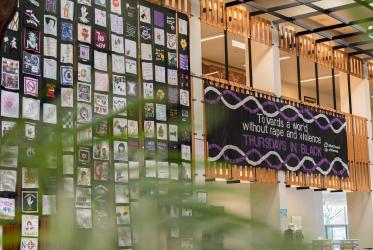A 90-minute discussion, organized by the World Council of Churches (WCC), Council for World Mission, and Lutheran World Federation offered insights into resources churches already have—and where churches can do better in committing gender-based violence.
Rev. Nicole Ashwood, WCC programme executive for Just Community of Women and Men, moderated the discussion, and participants wore black to observe the Thursdays in Black campaign for a world free from rape and violence.
“We are not here to just to look beautiful or handsome in our black,” said Ashwood. “We are not here just for the sake of being caught in one space at one time. We are here as members of the religious community to say, yet again, no to rape and violence.”
Daniela Gennrich, coordinator of We Will Speak Out, reflected that the webinar was a fitting way to begin observing the 16 Days campaign, an annual international campaign that begins on 25 November, the International Day for the Elimination of Violence against Women and ends on 10 December, Human Rights Day.
Gennrich also spoke as a survivor of gender-based violence. “We are not a uniform group,” she said. “The work with gender-based violence is not an add-on for any of us in ministry but an essential part of who we are.”
Sometimes, survivors of gender-based violence find themselves smothered with selective uses of scripture, she added. “We also need to look at our everyday ministry and the way we are working,” she said. “How do I acknowledge and include those around me, and exemplify what it means to be a safe space?”
Prof. Leith Dunn, a Jamaican sociologist, cited many examples of resources in the ecumenical world and in churches that have helped people raise awareness and prevent gender-based violence. She also added that churches need to critically examine their own culpability.
“Over years we have several experiences of pastors who have violated the rights of women and girls in their own congregations,” she said. “We love to put things under the table, right? I did some research and found there is a lot of information available on helping congregations to cope with this problem.”
Prof. Ezra Chitando, WCC Ecumenical HIV and AIDS Initiatives and Advocacy regional coordinator for Southern Africa, said churches have been building their capacity to raise awareness and prevent gender-based violence—but they can do even more.
“Violence against women and girls and men and LGBTQ individuals is a sin, and our pulpits need to echo this message very clearly and unambiguously,” he said. “Let us collectively and to the best of our abilities work toward a world without rape and violence.”
Bafana Khumalo, co-executive diretor of Sonke Gender Justice, spoke to what he defined as “the elephant in the room,” or misleading theologies that promote inequality and injustice. “For men to be allies, they must affirm the dignity and agency of women and girls,” he said.
Katlego Mohuba, an activist from Youth for Life-giving Food, Agriculture, and Fisheries, reflected that the church can do better to equip and empower women and youth in the communities.
“I know that in my own community, domestic violence, for example, is still widely related as a problem that the family can address or solve on their own,” she said. “So many times these women, these children, if they do have an alternative space to go to, they end up being susceptible to repetitive abuse,” she said. “I think what I hope is that we can work together to have an understanding of what it means to be a church that has a responsibility beyond Sunday.”








